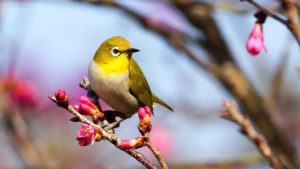Wildlife in your garden is certainly not restricted to the warmer months of the year. Even throughout winter there’s a hive of activity happening out there.
With the RSPB’s annual Garden Birdwatch taking place this weekend, we thought it would be a great time to talk about what birdlife you’re likely to see and how you can attract even more.
Previously, we provided you with some advice on how to create a bee friendly garden during summer, but what about during the winter?
Well, access to an unfrozen bird bath as well as having plenty seeds at your disposal will always help. However, you should also consider planting hedgerows or installing a nest box for longer term shelter.
By doing so, you’re likely to make this weekend’s Garden Birdwatch a lot easier to complete. So, here’s five birds you should watch out for…
House Sparrow
Having lived alongside humans since the Stone Age, it’s rather unfortunate that their numbers have declined in recent years. You’re likely to find them on your lawn, chewing away on some seeds.
Collared Dove
Since the 1950’s, the Collared Dove has been a regular visit to many of our gardens. You might not know it, but you’ll be familiar with their famous ‘cooing’ sound. Splashing around in the bird bath is where you’re most likely to see one.
Goldfinch
Bright faced and bushy winged, the Goldfinch is certainly one of the more colourful garden birds. However, they’re known to be quite aggressive when it comes to the bird feeding table. Watch out!
Robin
Their distinctive red breast is a very common sight during the winter months. Synonymous with the festive period, Robins are usually spotted lurking amongst hedgerows and feeding on worms.
Wren
Small, stocky and easily recognisable by their short cocked tail, the Wren is the final bird on our list. You’re likely to spot one hopping around the edges of your lawn, searching for food.
Well, we’ve just selected five our favourite garden birds to keep an eye on this weekend, but for more information about what other birds to spot, visit the RSPB’s Garden Birdwatch page.


